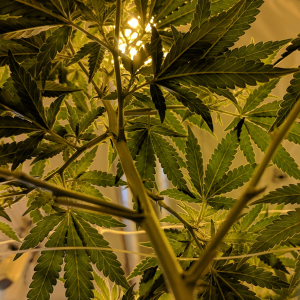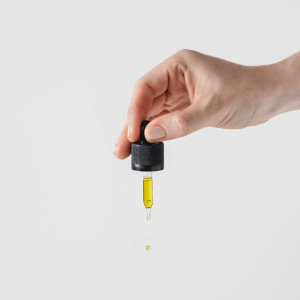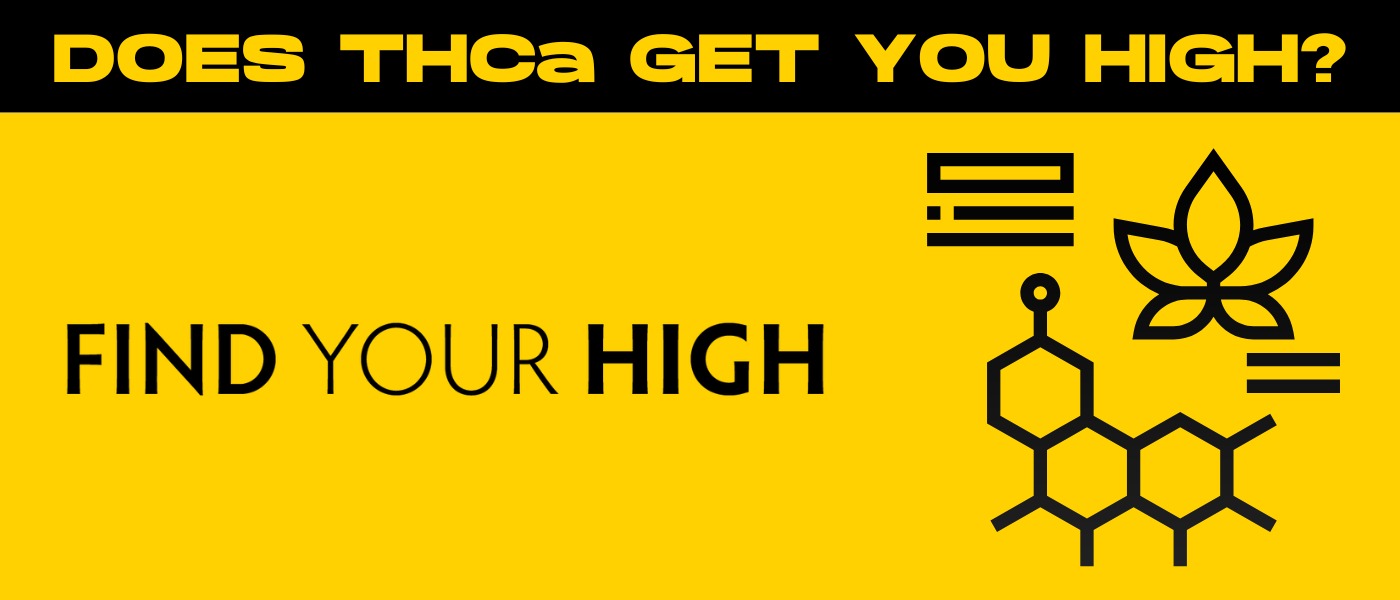As we dive deeper into the science behind cannabis, one topic continually comes to mind: Does THCa get you high?
Whether you’re new to the world of weed or a bonafide OG, you’re likely already familiar with THC, the main psychoactive compound in the cannabis plant.
And you’ve most likely heard of other cannabinoids such as CBD, which is among the most common chemical compounds.
However, you may not be as familiar with THCa, yet another common buzzword.
In this blog, we’re exploring everything you need to know about THCa. From what it is, to whether or not it gets you high, to its potential therapeutic properties, keep reading for all the details.
What is THCa?
Raw THCa, otherwise known as Tetrahydrocannabinolic acid, is the raw form, or acidic form, of the Tetrahydrocannabinol (THC) cannabinoid.
THCa is found in raw cannabis, which simply means that the cannabis flower hasn’t been dried, cured, or consumed by means of smoking or other forms of heat application.

How THCA Becomes THC
As a marijuana plant grows, it develops a cannabinoid known as CBGA. And as the marijuana continues to mature, CBGA eventually breaks down to produce THCa and CBDa.
And finally, tetrahydrocannabinolic acid converts into active THC in a process called decarboxylation. Basically, a fancy word that implies the use of heat, such as that used when smoking a joint or vaping cannabis oil, to transform THCa into the cannabinoid we all know and love, THC.

In other words, think of THCa as the precursor to THC because smoking THCa converts cannabinoids into psychoactive THC.
Does THCa Get You High?: THCa vs THC
Now for the question on everybody’s minds: Does THCa get you high?
Short answer: no. But it’s a little more complicated than that. Allow us to explain…
Unlike THC, the THCa cannabinoid found in the cannabis plant is non-intoxicating because it’s still in its acid form. This means that it does not produce the mind-altering high we often crave.
On a molecular level, tetrahydrocannabinolic acid lacks an essential additional carboxyl ring needed to bind to cannabinoid receptors in the brain in order to create intoxicating effects. So if a euphoric high is your goal, consuming raw cannabis isn’t the way to go.
But despite a lack of psychoactive properties, or the ability to even produce psychoactive effects, THCa is still just as important as its counterpart, THC.
Let’s discuss this.
Benefits of Tetrahydrocannabinolic Acid
Prior to the decarboxylation process, THCa isolate has its own benefits.
In the same way that we praise CBD for its potential therapeutic properties, we can’t help but appreciate yet another nonpsychoactive compound for its therapeutic potential: THCa.
Though more research is needed to fully explore its potential benefits, extracts primarily made up of THCa cannabinoids have been known to create a range of benefits, including:
- Anti-Inflammatory properties
- Neuroprotective properties
- Pain relieving properties
- Anticonvulsant properties
Additionally, tetrahydrocannabinolic acid may be an antiemetic, which means that it could be used to prevent nausea and vomiting. This is especially ideal for those undergoing intense treatment such as chemotherapy.

As mentioned, more research needs to be conducted in order to uncover the numerous benefits of THCa.
What is a High THCa Percentage in Hemp Flower Mean?
More often than not, avid cannabis consumers will choose their favorite strains based solely on THC percentage or THC content.
Though we admittedly advocate for terpene content over THC content, we won’t dive too deep into that particular debate.
Nonetheless, THCa content plays a role in your overall cannabis experience. This is because the application of heat at a certain temperature to pure THC could burn away some of the cannabinoid content and produce less potent mind-altering effects.
THCa flower, on the other hand, converts into THC through the aforementioned decarboxylation process.
In other words, THCa content is a more comprehensive representation of the psychoactive properties of any given strain given that in order to consume cannabis (aside from edibles), heat must be used and THCa will inevitably convert into THC cannabinoids.
Key Takeaways
So does THCa get you high? No, but it easily undergoes a decarboxylation process and converts into THC, which is a cannabinoid that will surely produce the psychoactive effects commonly associated with marijuana.
1. Can you consume THCa to get high?
No, THCa itself does not produce any psychoactive effects. Therefore, consuming it in its raw form, such as eating raw cannabis, will not produce a high. To experience the intoxicating effects of THC, the THCa must be converted to THC through consumption processes like heating, smoking, vaporizing, or cooking with cannabis at certain temperatures above, or around, 220°F.
2. What are the potential risks of consuming THCa?
THCa is generally considered to be safe for consumption; however, it’s important to note that more research is needed to fully understand its effects on the mind and body. However, with the knowledge that we currently have on THCa, it could present a few potential risks, such as those related to psychiatric effects, respiratory issues, or addiction and dependency on cannabis.
3. Are there any drug tests that can detect Tetrahydrocannabinolic Acid in the body?
Fun fact: Despite its nonpsychoactive effects, a specialized drug test is highly likely to detect trace amounts of THCa for an extended period of time. However, these tests are not commonly used for routine drug screening purposes and are typically reserved for specific situations where a detailed analysis of cannabis compounds is necessary.
4. How do you consume THCa?
Consuming THCa in its raw form can be challenging because it is not psychoactive until it undergoes decarboxylation, a process that converts THCa into THC. However, if you still want to consume THCa in its raw state, you could do so through methods such as sublingual administration but more information is needed to understand the ideal dosage.

 Rewards
Rewards





